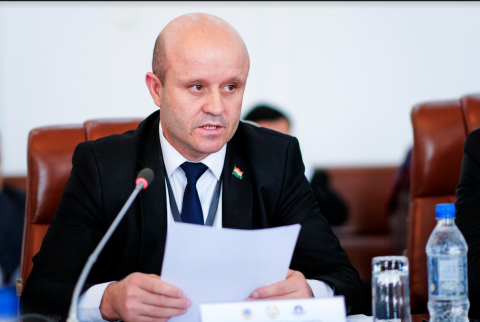Freedom from Torture
Civil Society Coalition against Torture and impunity in Tajikistan

Foteh Quvvatzoda, Judge of the Constitutional Court of the Republic of Tajikistan stated on October 25 in Dushanbe speaking at the conference "Combating Torture: Experience and Achievements" that the Constitutional Court of the Republic of Tajikistan acts to protect fundamental rights and freedoms of citizens, ensuring the supremacy and direct action of the Constitution.
According to him, in the area of freedom from torture, the Constitutional Court follows three directions: in order to protect the fundamental rights and freedoms of citizens, the Constitution prohibits the use of torture, in order to ensure the supremacy of the Constitution, all normative legal acts in force in Tajikistan, must conform with the Constitution, for the purposes of direct effect of the Constitution - if normative legal acts in general or individual articles thereof are found by the Constitutional Court to be inconsistent with the Constitution and, in particular, they identify the basis to implement torture, they lose their legal validity and cannot be further applied.
Quvvatzoda in his speech referred to the case of Ismonboy Boboev, who died in 2010, allegedly as a result of torture in detention. Juraboy Boboev, the father of the deceased, as well as his lawyers, were not allowed to study the materials of the criminal case for almost two years. The reason was the existence of a legislative norm prohibiting the victim or his representative to become familiar with the materials of the criminal case before the end of the preliminary investigation.
In 2012, I. Boboev's family lawyers filed a request to the Constitutional Court of the Republic of Tajikistan, requesting recognition of Article 42, part 2, paragraph 8, of the Code of Criminal Procedure of the country restricting the rights of the victim as contrary to two articles of the Constitution, Article 17 (All are equal before the law) and article 21 (Law protects the rights of the victim. The state guarantees the victim judicial protection and compensation for the damage caused).
However, on May 15, 2012, in the course of public court proceedings, the Constitutional Court found no contradiction to the Constitution in this provision of the Law.
The conference was organized by the Civil Society Coalition against Torture and Impunity in Tajikistan together with the Prosecutor General's Office of the Republic of Tajikistan with the assistance of the OSCE Program Office in Dushanbe, International Commission of Jurists and Sigrid Rausing Trust.
The main purpose of the conference was to discuss pressing issues in the area of combating torture and ill-treatment in Tajikistan.
The conference was attended by international experts, representatives of state bodies, law enforcement agencies, courts, the prosecutor's office, the Office of the Commissioner for Human Rights in Tajikistan, international organizations and embassies, as well as public organizations, members of the Civil Society Coalition against Torture and Impunity in Tajikistan, and the mass media.